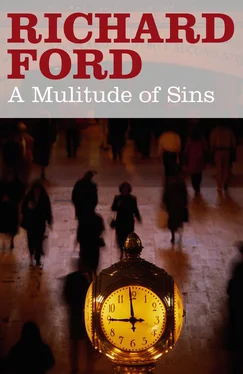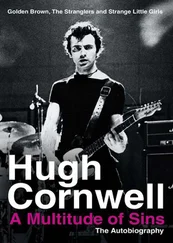She stared at the brightly lit police substation. The uniformed police were steering the young, handcuffed black man into a wire cage in the back of the room. It was like an animal’s cage. She felt suddenly dispirited and in fear of starting to cry right on the phone. Gin made women fuck, then cry, then fight, her father always said. She needed to stay away from gin. Ed, of course, was still handsome — a big, gruff, blue-eyed Boston-Irish whose life, unfortunately, hadn’t made him happy. Though he loved her. That she knew. It was a shame. Lately he’d begun growing hydrangeas in the back yard, which seemed nice. “I wish you could see the Grand Canyon with me, honey.”
“Maybe I’ll fly out there tonight,” Ed said sarcastically, and expelled a dry little cough-laugh.
“That’d be great. I’d come pick you up.”
“Maybe I could just jump in,” Ed said bitterly. “That’d be great, too, wouldn’t it?”
“No, sweetie. That wouldn’t.”
Unexpectedly from across the parking lot she saw Howard emerge from the restaurant, a toothpick in his mouth. He glanced at the crowded street, then started off down the strip-mall sidewalk. He passed right in front of the police station. Two of the desk officers inside stopped what they were doing and looked out the window at him. Howard was odd looking — tall and gawky, like somebody out of the fifties.
But where was he going! She felt her heart beat three then two sudden beats. Was he taking off? Heading across to the Arco station to hitch a ride back? Her heart bumped three more percussive bumps as she watched Howard stride along in his almost-graceful gait and geek haircut (he looked ridiculous in his terry-cloth shorts, big T-shirt and sockless sneakers). But she felt panicky — as if a disaster was unfolding right in front of her, and she couldn’t stop it. Like running over the rabbit. Ka-thunk, ka-thunk , her heart pounded. She realized she didn’t really care if he left, but the sight of his leaving made her almost paralyzed.
“Oh Jesus, don’t leave,” she said.
“My feet are disintegrating. I probably won’t be alive in a year. That’s where I’m going,” Ed said.
“What’s that?”
“What did I say?” Ed said. “I said …”
When Howard reached the asphalt apron of the Arco station, he turned left directly into the empty phone booth and began punching in numbers, though as he did it he craned his neck around in her direction, grinning at her, phone to phone — each calling his or her spouse to report where each of them was, leaving out the crucial part of the story. That absolutely wasn’t how life should be, she thought. Life should be all on the up-and-up. She wished she was here alone and there weren’t any lies. How good that would feel. To be all alone in Flagstaff.
“Maybe you just don’t know what fuckin’ fed up is,” Ed was saying angrily.
“I’m sorry, sweetheart, what is it? You’re breaking up. It’s way out in the prairie out here.”
“Prairie schmarry,” Ed snarled. Something had set Ed off. “We were already breaking up.”
“You don’t need to say that,” Frances said. She was trying to push Howard out of her thinking, trying to concentrate on Ed, her husband, furious at her for going to the Grand Canyon, furious at her for enjoying herself, or trying to, furious at her for being herself and not being him. Maybe she didn’t know what fed up meant. “Why don’t you take a pill and let me call you later, hon, okay?” She stared at Howard, his back turned, his head bobbing back and forth. He was talking animatedly to his wife in Connecticut. Happily lying.
“ You take a pill,” Ed said. “And then disappear.”
“That’s not very nice.”
“That’s what I was just thinking,” Ed said.
“I’ll call you later, sweetheart,” she said softly.
“I’ll be asleep later.”
“Sleep tight, then,” she said, and folded her phone away.
Out again in the darkened desert, Howard ran his window down to let in the rich cooling breezes. Frances had put on some watery new-age electronic music that was making him woozy. He took his shoes off, tilted back and faced the landscape behind the barrier of the night.
A little band of nastiness which he definitely didn’t appreciate had begun widening between them all the way up to Flagstaff. It was the sort of thing you suffered in the workplace. Except, precisely because it was the workplace and not your real life, you weren’t stuck with whoever it was the way he was stuck now with nutty Frances. Which explained why being married was so good — at least the way he understood it: if you married the right person (and he had), you didn’t experience unwelcome surprises and upsets. The more you got to know that right person, the better it got — not the worse and more discouraging. You liked them and you liked life. The institution took you to deeper depths, and you felt serious things you wouldn’t otherwise feel. Idiotic and unnecessary escapades like this trip just didn’t come up. He hadn’t been married long enough to fully appreciate all this — a year, only — but he was beginning to. Of course, it was also nice to be spinning along in a big expensive car, headed for some unknown exotic place, where the night would be spent screwing an attractive woman you didn’t have to take care of the rest of your life. Still, though, he was sorry not to have just gotten on a bus in Flagstaff. Frances would probably have welcomed it. He’d just forgotten.
Occasionally a dimly lit settlement rocketed past. A scattering of lights, some shadowy men standing outside a bar or a crummy store or beside a row of pickups, seemingly unaware of the highway.
“Indians,” Frances said authoritatively. She’d elevated her seat and resituated closer to the steering wheel, so she appeared to be a tiny pilot in a green-lit cockpit. “We’re on the Hopi reservation here.”
“We don’t want to break down, then,” Howard said.
“I’m sure they’d take good care of us.”
“As soon as they finished stripping the car and killing us. That’s probably true. They’d give us a decent burial up on some platform.” He stared into the night, where a single socketed light glowed like a boat on the ocean. “I have Indian blood in me,” he said for no particular reason. “My father was a Paiute, and my mother’s named Sue.” It was a joke he’d never thought was funny before but seemed amusing now. “My mother is named Sue. Sue Crosby,” he added, feeling better about things, including Frances. The nastiness seemed to have drifted away suddenly. Though he wasn’t crazy about how she came off in her white shorts (too tight) and her blue blouse with the dopey, hand-painted anchor. She looked like a little Polack — somebody who sold cheap houses to other Polacks and bought her clothes at Target. She was too muscular, too — like somebody on the Polish gymnastics team. Somebody named Magda. Her body wasn’t that great to touch. He preferred softer, less toned-up women like his wife. Though Frances was older and, he assumed, had to take better care of herself.
On an impulse, he reached across the seat, unfastened her small right hand from the steering wheel and grasped it in his own hand. “I’ve been wanting to do that,” he said, though it wasn’t true.
“Okay,” she said, not looking at him, just peering ahead into the tunnel of light.
“I was thinking about those Japanese in the restaurant,” he said. “How weird is that? In fucking Flagstaff. Indians. Desert. Snakes. You wonder how they got there.” He squeezed her hand for emphasis. He hated electronic music and switched it off before it made him carsick.
“They’re everywhere now, I guess,” Frances said in the new silence. “I’ve sold houses to them. They’re nice. They take care of their stuff.”
Читать дальше












